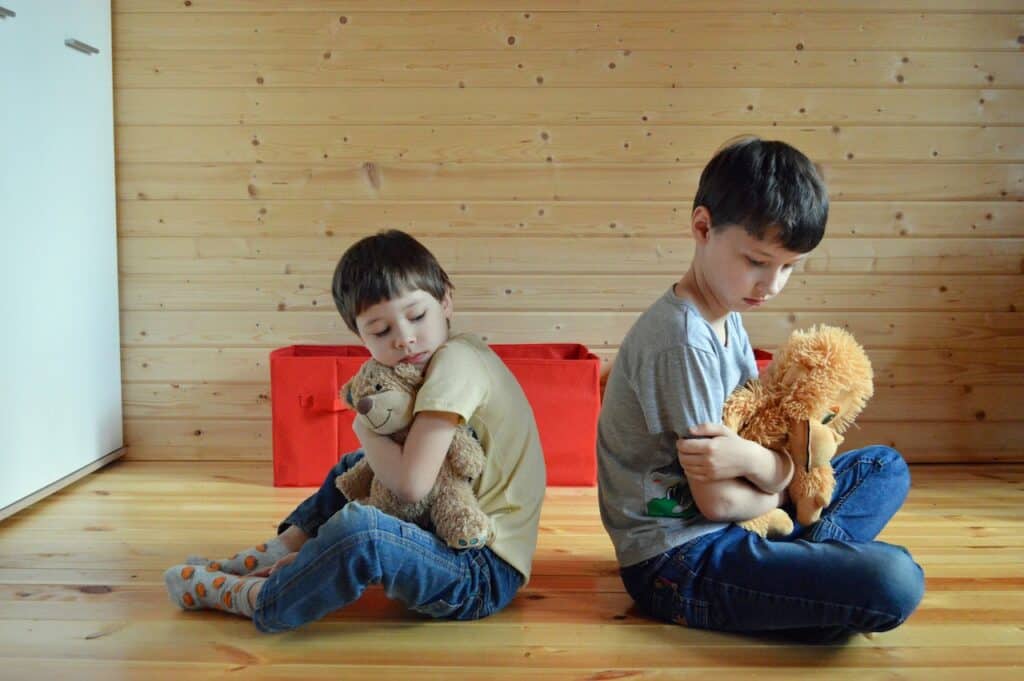Child jealousy is a common issue that parents face, and it can be challenging to navigate. Children may become jealous of their parents’ affection towards siblings, other family members, or even pets. This jealousy can lead to negative behaviors such as acting out, throwing tantrums, or withdrawing from family activities.
Understanding the root cause of jealousy in children is crucial in managing the issue. While jealousy may be a natural emotion, it can stem from a variety of factors such as feeling neglected, insecure, or seeking attention. It is essential to identify the underlying cause to address the issue effectively and prevent it from escalating.
Key Takeaways
- Child jealousy is a common issue that can lead to negative behaviors.
- Identifying the root cause of jealousy is crucial to managing the issue.
- Addressing the issue effectively can prevent it from escalating.
Understanding Child Jealousy
The Phenomenon of Jealousy
Jealousy is a common emotion among children. It is a feeling of insecurity, fear, and resentment that arises when a child feels that their parents are giving more attention or affection to another child. This phenomenon can occur for many reasons, such as the arrival of a new sibling, a parent’s busy schedule, or a child’s perception that their sibling is being favored.
Human Emotion and Jealousy
Jealousy is a natural human emotion that can be experienced by people of all ages. It is a complex emotion that can be triggered by a variety of factors, including a sense of competition, insecurity, and a fear of loss. Children, in particular, may struggle with jealousy because they are still developing their emotional regulation skills and may not yet have the ability to express their feelings in a healthy way.
Developmental Stage and Jealousy
Jealousy can be more prevalent during certain developmental stages. For example, toddlers may struggle with jealousy when a new sibling arrives, as they are still learning to share and may not yet understand the concept of sibling relationships. Similarly, older children may struggle with jealousy when they feel that their parents are not giving them enough attention or when they are going through a difficult time, such as a divorce or a move to a new school.
In conclusion, understanding child jealousy is important for parents and caregivers. By recognizing the factors that contribute to jealousy and learning how to help children express their feelings in a healthy way, parents can support their children in developing strong emotional regulation skills and healthy relationships with siblings and peers.
Causes of Jealousy in Children
Jealousy in children is a common emotional response that can be triggered by various factors. Understanding the causes of jealousy in children can help parents and caregivers address the issue and support their child’s emotional development.

Neglect and Abandonment
Neglect and abandonment are some of the most common causes of jealousy in children. When a child feels neglected or abandoned by their parents, they may develop feelings of jealousy towards siblings or other family members who receive more attention. Neglect and abandonment can take many forms, such as physical and emotional neglect, lack of affection, or not being present in the child’s life.
Comparison and Favoritism
Comparison and favoritism can also lead to jealousy in children. When parents compare their child to others or show favoritism towards one child over another, it can create feelings of inadequacy and jealousy. This can be particularly challenging for children who are naturally competitive or have low self-esteem.
Introduction of a New Family Member
The introduction of a new family member, such as a new sibling or step-parent, can also trigger jealousy in children. This is especially true if the child feels like they are losing attention or resources to the new family member. Additionally, children may feel like they are being replaced or that their position in the family is being threatened.
In conclusion, understanding the causes of jealousy in children is an important step in helping children navigate their emotions and develop healthy relationships with others. By addressing the underlying causes of jealousy, parents and caregivers can support their child’s emotional well-being and foster positive family dynamics.
Signs of Jealousy in Children

Aggressive Behavior
Jealousy in children can manifest in different ways, and one of the most common signs is aggressive behavior. When a child feels jealous of their parent’s affection towards another sibling or parent, they may become physically aggressive towards them. This behavior can include hitting, biting, or pushing. The child may also become verbally aggressive and use hurtful words towards their sibling or parent.
Interrupting Private Time
Another sign of jealousy in children is interrupting private time between the parent and the other sibling. The child may feel left out and want to be the center of attention. They may interrupt conversations or activities between their parent and sibling to get attention. This behavior can be frustrating for the parent and the other sibling.
Negative Emotion Expressions
Jealousy can also cause children to express negative emotions. They may become sad, angry, or moody when they see their parent showing affection towards their sibling. The child may also feel neglected and unloved, leading to low self-esteem. This negative emotion expression can affect the child’s mental health and well-being.
In conclusion, parents should be aware of the signs of jealousy in children to address the issue before it becomes a bigger problem. By understanding the behavior and emotions of their child, parents can help the child cope with their jealousy and build a healthy relationship with their siblings.
Effects of Jealousy on Child Development
Impact on Attachment
Jealousy can have a significant impact on a child’s attachment to their parents. When a child feels jealous of their parent’s affection towards their siblings or other people, they may feel neglected or unimportant. This can lead to a breakdown in the attachment between the child and their parent, as the child may feel that their needs are not being met. In extreme cases, the child may develop an insecure attachment style, which can have long-term negative effects on their relationships with others.
Influence on Adult Relationships
Jealousy in childhood can also have an influence on a child’s adult relationships. If a child does not learn to manage their jealousy in a healthy way, they may struggle with jealousy in their romantic relationships as an adult. This can lead to issues with trust, communication, and intimacy, which can ultimately damage the relationship.
Potential for Behavioral Problems
Jealousy can also lead to behavioral problems in children. Children who are jealous may act out in an attempt to get attention or to get their needs met. This can lead to disruptive behavior in school, difficulty making friends, and even more serious behavioral problems such as aggression or substance abuse.
It is important for parents to recognize the signs of jealousy in their children and to address it in a healthy and constructive way. This can include setting aside one-on-one time with the child, encouraging them to express their feelings, and helping them to develop coping strategies for managing their jealousy. By addressing jealousy in a positive way, parents can help their children to develop healthy relationships with others and to thrive in all areas of their development.
Managing Child Jealousy

Effective Communication
Effective communication is key when it comes to managing a child’s jealousy of their parent’s affection towards others. It is important for parents to talk to their child and explain that they love them just as much as they love anyone else. The child needs to understand that their parent’s love is not finite and that they will always be loved no matter what.
When communicating with the child, it is important to be clear and concise. Use simple language that the child can understand and avoid using complicated words or phrases. It is also important to listen to the child and acknowledge their feelings. Let them know that their feelings are valid and that they are entitled to feel the way they do.
Consistent Affection
Consistent affection is another important aspect of managing a child’s jealousy. It is important for parents to show affection to their child on a regular basis. This can be done through hugs, kisses, and spending quality time with them.
Parents should also make an effort to include their child in activities that they enjoy. This will help the child feel included and valued. It is important to remember that a child’s jealousy may stem from feelings of inadequacy or insecurity, so consistent affection can help alleviate these feelings.
Validation of Emotions
Validating a child’s emotions is crucial when managing their jealousy. Parents should acknowledge their child’s feelings and let them know that it is okay to feel jealous. It is important to avoid dismissing their feelings or telling them that they are being silly.
Parents can also help their child work through their jealousy by encouraging them to express their feelings in a healthy way. This can be done through writing, drawing, or talking about their feelings. It is important for parents to be patient and understanding during this process.
In conclusion, managing a child’s jealousy of their parent’s affection requires effective communication, consistent affection, and validation of emotions. By implementing these strategies, parents can help their child feel loved and valued, while also addressing their jealousy in a healthy way.
Professional Help for Child Jealousy

Role of a Therapist
A therapist can play an important role in helping a child overcome jealousy towards their parents. They can provide a safe and confidential space for the child to express their feelings and work through their emotions. A therapist can also help the child develop coping skills and strategies to manage their jealousy in a healthy way.
Benefits of Family Therapy
Family therapy can be a valuable tool in addressing jealousy within the family dynamic. It allows everyone to come together and communicate openly about their feelings and concerns. A therapist can facilitate these conversations and help family members understand each other’s perspectives. Family therapy can also help identify any underlying issues that may be contributing to the child’s jealousy.
When to Seek Help
If a child’s jealousy is causing significant distress and interfering with their daily life, it may be time to seek professional help. This could include therapy for the child, family therapy, or a combination of both. It’s important to address jealousy early on before it becomes a more serious issue.
Overall, seeking professional help can be an effective way to address a child’s jealousy towards their parents. A therapist can provide guidance and support to both the child and the family, helping everyone work towards a healthier and happier dynamic.
Final Thoughts on Child Jealousy
In conclusion, child jealousy is a common occurrence in many families. It is important for parents to recognize the signs of jealousy and address them appropriately. It is also important for parents to show equal affection to all their children to avoid any feelings of jealousy.
Parents can help their children deal with jealousy by teaching them coping mechanisms such as expressing their feelings in a healthy way, practicing gratitude, and focusing on their own strengths and accomplishments.
It is also important for parents to create a safe and open environment where their children feel comfortable expressing their feelings and concerns. This can help prevent jealousy from escalating into more serious issues such as depression or anxiety.
Overall, while jealousy is a normal emotion, it is important for parents to address it in a healthy and constructive manner. By doing so, parents can help their children develop healthy coping mechanisms and build stronger relationships with each other.
Frequently Asked Questions
How can parents help a jealous child?
Parents can help a jealous child by giving them individual attention and praise for their unique qualities and accomplishments. It is important to validate their feelings and teach them healthy ways to cope with jealousy, such as expressing their emotions and finding positive outlets for their energy.
What are some signs of jealousy in children?
Signs of jealousy in children can include acting out, seeking attention, and displaying negative behaviors towards the object of their jealousy. They may also become withdrawn or exhibit physical symptoms such as headaches or stomachaches.
How can parents deal with sibling jealousy in toddlers?
Parents can deal with sibling jealousy in toddlers by establishing clear boundaries and rules, and encouraging positive interactions between siblings. It is important to avoid playing favorites and to give each child individual attention and praise.
What are the psychological effects of a daughter being jealous of her mother?
A daughter being jealous of her mother can lead to feelings of low self-esteem, anxiety, and depression. It can also strain the mother-daughter relationship and lead to long-term emotional issues.
What are the causes of extreme jealousy in children?
Extreme jealousy in children can be caused by a variety of factors, including insecurity, lack of attention, and feelings of inadequacy. It may also be a symptom of underlying mental health issues such as anxiety or depression.
Why might a child reject their parent’s affection?
A child may reject their parent’s affection due to feelings of jealousy or insecurity. They may also be experiencing emotional or physical discomfort, or simply be in a bad mood. It is important for parents to communicate with their child and try to understand the root of their behavior.
Related Post: When Do Babies Learn Their Names?

Iesha is a loving mother of 2 beautiful children. She’s an active parent who enjoys indoor and outdoor adventures with her family. Her mission is to share practical and realistic parenting advice to help the parenting community becoming stronger.
